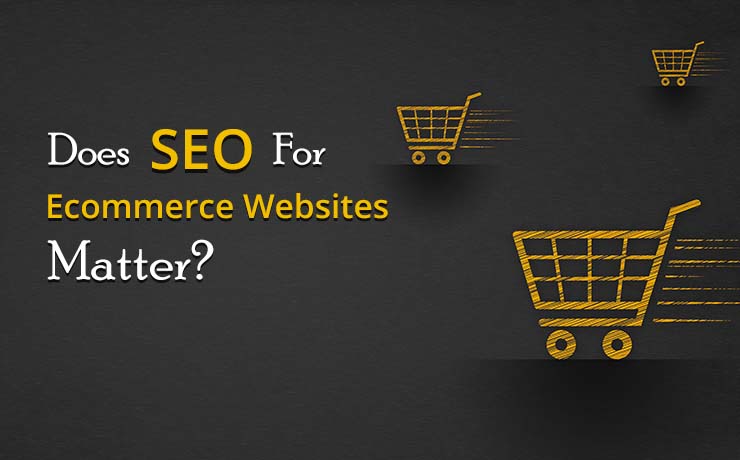Does SEO For Ecommerce Websites Matter?

Clement Foo
Senior Digital Content Manager

Did you know that SEO produces the highest long-term returns for ecommerce websites? As opposed to traditional forms of marketing such as placing ads in newspapers and shops, SEO is able to yield such great results because any customer who lands on your website through organic search does so actively. Whereas traditional ads take an “in your face” approach – appearing for any customer who happens to browse or land on that particular medium – SEO customers specifically searched for a product you provide or a concern you can address. This makes them the group of customers who are most likely to convert.
Many ecommerce merchants make the mistake of thinking that PPC and social media marketing are all they need to stand out from the competition. They couldn’t be more wrong. While the most successful marketing campaigns feature a combination of SEO, PPC and social media marketing, SEO is the most sustainable form of online marketing you can invest in. We explain why in this article.
There is No “Close Second” When it Comes to Click Through Rate (CTR)
Everyone knows that websites on the first page of Google SERPs have the highest CTRs and that out of these sites, the #1 result comes out top. However, many people may not know that ranking on the second page of Google SERPs is not a “close second”. In fact, the truth is far from it. On average, you can expect your CTR to increase by approximately 31% when you move up one spot in SERPs. Statistically, customers are more likely to click on a website on the first page of a SERP than one on the 10th page. The numbers say it all: ecommerce websites cannot afford to neglect SEO. If your goal is to widen brand exposure to as many customers as possible, SEO is the way to achieve it.
Visibility is The Word
Today, at least half of all consumers rely on online search to inform their purchase decisions, with almost 20% crediting search engines as the most influential factor. For customers to even consider purchasing from your ecommerce website, they first have to know that your brand exists. Even if you have great products, your business will not do well if nobody knows about it.
SEO helps to increase a brand’s visibility, driving up website traffic and conversion rates. This means that investing in SEO marketing quickly pays for itself as a positive feedback loop is generated: the more people know about your business, the more purchases you will get. As purchases are made, word gets out about your products or services, driving website traffic.
SEO Generates Sustainable Results
While the results you can get from PPC and social media marketing can be substantial, they may not be sustainable. Once you take down your PPC ad or stop working with the influencer who helped to promote your products on social media, sales rates tend to experience a quick and dramatic fall. While there is no denying that PPC and social media marketing can be implemented to great effect, results tend to be limited to the period where the campaign is active. In contrast, SEO focuses on generating loyal long-term customers and its effects can be felt for years after the initial campaign has been launched.
Positive Feedback Loop: Great User Experience and SERP Rankings
We have come a long way since the early days of the Internet. Today, strategies such as keyword stuffing no longer gets past Google. In the past, it was a common practice for businesses to publish unnatural sounding blog posts, interspersing a keyword as many times as possible throughout an article. Yet others inserted keywords in the same colored font as their website background to boost rankings. Thankfully, Google algorithms have become wise to these tricks and is more sophisticated than ever before. The result is that user experience has become a SERP major ranking factor.
What this means is that Google rates websites that customers find “helpful” higher up in SERPs. How it determines this is through data such as the CTR, the length of time users spent on your website, bounce rate and more. When users land on your ecommerce website through organic search results, or SEO, they are likely to spend longer on it because what you offer is directly relevant to what they are looking for. That contributes to Google’s perception of your website as “helpful”, boosting your SERP ranking and visibility. It becomes a positive feedback loop: the higher you rank on organic SERPs, the more users are going to visit your website and the more “helpful” Google will deem your website to be.
Build Credibility and Trust in Your Brand
Another reason keyword stuffing no longer works is that search engines have evolved to filter out spam websites. This means that high-ranking results are ones that Google deem credible and trustworthy, on top of being rated “helpful” by users. When your ecommerce website lands a spot on the first page of a SERP, it is telling customers that Google trusts your business and therefore, they should, too. Similar to the positive feedback loop generated by a great user experience, ranking highly on Google SERPs can help customers build trust in your brand and establish credibility. There can be no question that the benefits of ecommerce SEO are numerous. Any business that makes use of a multipronged online marketing approach can tell from the sales data in their Google Analytics account that organic search is what produced the highest returns. If that is not true of your business, your SEO campaign may be outdated or needs optimizing. Do not underestimate the importance of SEO: weeks and months after your PPC ad or social media campaign has ended, SEO is still doing all the hard work for your business. If you want your ecommerce website to stand out and survive in the increasingly competitive world, you cannot afford to neglect SEO.
 Free
Consultation
Free
Consultation Free
Google Ads Audit
Free
Google Ads Audit







